How to make compost tea for plants-2024
DATE : 12 February 2024 By : Tareq Qteshat

Table of Contents
ToggleWhat is Compost Tea?

Compost tea is a liquid fertilizer that is created by steeping compost in water. It is like a magic elixir for plants, providing them with a nourishing boost of nutrients and beneficial microorganisms. As a passionate gardener, I have discovered the incredible benefits of compost tea in improving plant health and promoting vigorous growth.
Compost tea is a natural and organic method of fertilizing plants. It helps to increase the microbial population in the soil, which in turn enhances soil health and nutrient availability for plants. The microorganisms present in compost tea break down organic matter and make it more accessible to plants, improving the overall fertility of the soil.
Using compost tea can also help prevent diseases and pests in your garden. The beneficial bacteria and fungi present in the tea help to establish a healthy soil microbiome, which can act as a natural defense against harmful pathogens.
Overall, compost tea is a fantastic tool for organic gardening and sustainable gardening practices. It is easy to make at home and can greatly improve the health and productivity of your plants.
What is compost tea and why is it beneficial for plants?

Compost tea is a nutrient-rich liquid fertilizer that is created by steeping compost in water. It is beneficial for plants because it provides a concentrated source of essential nutrients, beneficial microorganisms, and organic matter.
When plants receive compost tea, they are able to absorb nutrients more easily, leading to enhanced growth, improved flowering, and increased productivity. The microorganisms present in compost tea help to break down organic matter in the soil, releasing nutrients that plants can readily access.
Compost tea also improves soil structure and fertility, making it easier for plant roots to penetrate the soil and access water and nutrients. It helps to enhance soil microbial activity, creating a healthy soil microbiome that promotes nutrient cycling and disease resistance.
In addition, compost tea can suppress the growth of harmful pathogens and pests, reducing the need for chemical pesticides. Overall, compost tea is a natural and sustainable way to nourish and protect plants, resulting in healthier, more vibrant gardens.
The science behind compost tea and how it helps improve plant health.
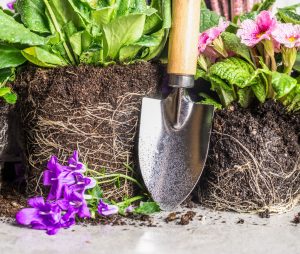
Compost tea is not just a simple liquid fertilizer. It is a powerhouse of nutrients, microorganisms, and organic matter that work together to benefit plants in various ways. The science behind compost tea lies in its ability to enhance the soil microbiome and nutrient availability.
When compost is steeped in water, beneficial microorganisms, such as bacteria, fungi, and protozoa, are extracted and multiply during the brewing process. These microorganisms play a crucial role in breaking down organic matter in the soil, making essential nutrients more accessible to plants. They also form symbiotic relationships with plant roots, helping them absorb nutrients more efficiently.
Compost tea also contains humic and fulvic acids, which improve soil structure and water-holding capacity. This allows plant roots to penetrate the soil easily and access water and nutrients.
Furthermore, the presence of beneficial microorganisms in compost tea helps to suppress harmful pathogens and pests, reducing the need for chemical pesticides.
Overall, the science behind compost tea lies in creating a healthy soil ecosystem that supports plant growth, enhances nutrient cycling, and provides natural defenses against diseases and pests.
Making Compost Tea: Basic Ingredients and Equipment

To make compost tea, you will need a few basic ingredients and equipment. Here’s what you’ll need:
- Compost: Start with high-quality compost as the base for your tea. This can be homemade or purchased from a local garden center. The compost should be rich in organic matter and well-aged.
- Water: Use non-chlorinated water for brewing your tea. Chlorine can harm the beneficial microorganisms in the compost.
- Container: Use a large bucket or container to brew the tea. Make sure it is clean and food-grade.
- Aeration system: For aerobic compost tea brewing, you will need an aeration system, which includes an air pump, air stones, and tubing. This helps oxygenate the tea during the brewing process.
- Strainer: Once the brewing process is complete, you will need a strainer or cheesecloth to strain out any solid particles from the tea before applying it to your plants.
By having these basic ingredients and equipment, you can easily start brewing your own compost tea to enhance your plant’s growth and overall health.
Essential ingredients for compost tea
:max_bytes(150000):strip_icc()/GettyImages-1253496831-11b73ed6b0084181afbf7eed0a453549.jpg)
When making compost tea, there are a few essential ingredients that you will need. These ingredients will help create a nutrient-rich and microbe-filled solution that can benefit your plants. Here are the key ingredients you’ll need:
- Compost: High-quality compost is the foundation of compost tea. It should be well-aged and rich in organic matter. This provides the necessary nutrients and microorganisms for plant growth.
- Water: Non-chlorinated water is crucial for brewing compost tea. Chlorine can harm the beneficial microorganisms in the compost. Use filtered or dechlorinated water for best results.
- Food Source: Adding a food source like molasses or kelp meal can help stimulate microbial activity in the compost tea. This provides extra nutrients and encourages the growth of beneficial bacteria and fungi.
By combining these essential ingredients, you can create a potent and beneficial compost tea that will enhance the health and growth of your plants.
Necessary equipment for brewing compost tea

In order to brew compost tea, you will need a few essential pieces of equipment. Here are the necessary items:
- Bucket or Container: You will need a large bucket or container to hold the compost tea mixture.
- Aeration Device: If you are using the aerobic compost tea brewing method, you will need an aeration device such as an aquarium air pump and air stone. This will help oxygenate the tea and promote the growth of beneficial microorganisms.
- Strainer: It is important to strain the finished compost tea before applying it to your plants. This will help remove any large particles or debris that may clog the sprayer.
- Sprayer or Watering Can: You will need a sprayer or watering can to apply the compost tea to your plants. This will ensure an even and thorough distribution of the tea.
With these basic pieces of equipment, you will be well equipped to brew and apply homemade compost tea to enhance the health and growth of your plants.
Brewing Methods

There are two main methods for brewing compost tea: aerobic and anaerobic.
Aerobic compost tea is made by brewing compost in oxygen-rich conditions. This method promotes the growth of beneficial aerobic bacteria and fungi, which are essential for healthy plant growth. To make aerobic compost tea, I fill a bucket with water and add compost. Then I aerate the mixture using an aquarium air pump and air stone for 24-48 hours.
Anaerobic compost tea, on the other hand, is made by brewing compost in oxygen-depleted conditions. This method favors the growth of anaerobic microorganisms, which can still be beneficial for plants. To make anaerobic compost tea, I place a smaller amount of compost in a bucket of water and cover it with a lid to prevent oxygen from entering. After letting it sit for 3-7 days, I strain the mixture and use it as a soil drench.
Both brewing methods have their advantages and can be used in different situations. It’s important to choose the method that works best for your plants and soil conditions.
Aerobic compost tea brewing method

To make aerobic compost tea, I start by filling a bucket with water. I then add high-quality compost to the water, making sure to use a ratio of approximately 1 part compost to 5 parts water. The compost should be well-aged and free from any pathogens or contaminants.
Once the compost is added to the water, I introduce oxygen into the mixture using an aquarium air pump and air stone. This aeration process is crucial for creating an oxygen-rich environment that promotes the growth of beneficial aerobic microorganisms.
I let the compost tea brew for 24 to 48 hours, continuously aerating the mixture during this time. The oxygen helps stimulate the growth of bacteria, fungi, and other beneficial microorganisms that will enhance the health and fertility of the tea.
After the brewing period, I strain the compost tea to remove any leftover solids, and I dilute it with water at a ratio of 1 part compost tea to 10 parts water. This ensures that the tea is at the optimal strength for application to plants.
Using an aerobic compost tea brewing method provides plants with a boost of beneficial microorganisms, improves soil quality, and helps plants resist diseases and pests.
Anaerobic compost tea brewing method
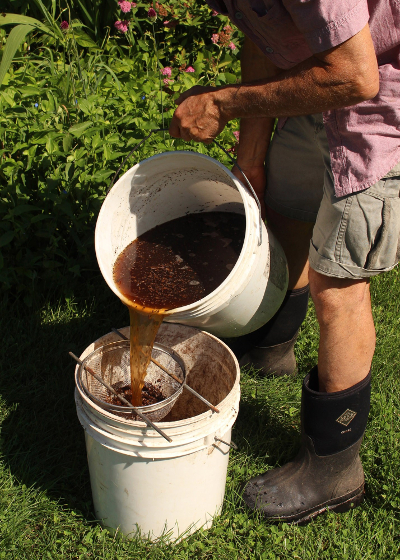
When it comes to brewing compost tea, there are two main methods: aerobic and anaerobic. In the aerobic method, which I discussed earlier, oxygen is introduced into the mixture to stimulate the growth of beneficial aerobic microorganisms. However, in the anaerobic method, the compost tea is brewed in the absence of oxygen.
To make anaerobic compost tea, I start by filling a bucket with water and adding compost to it in a ratio of 1 part compost to 5 parts water. Unlike the aerobic method, I do not introduce oxygen into the mixture.
Instead, I cover the bucket with a lid or plastic wrap to create a sealed environment. This lack of oxygen promotes the growth of anaerobic microorganisms, such as certain types of bacteria.
The anaerobic brewing process typically takes longer than the aerobic method, usually around 5 to 7 days. After the brewing period, I strain the tea to remove any remaining solids. It’s important to note that anaerobic compost tea may have a strong odor due to the production of sulfur compounds.
While anaerobic compost tea can still provide some benefits to plants, it is generally considered less effective than aerobic compost tea.
Application and Usage
:max_bytes(150000):strip_icc()/using-manure-tea-in-the-garden-2539481-5-574c3b1e46c445bc9b190e269decd0f0.jpg)
The application of compost tea in gardening and agriculture is a versatile and effective way to improve plant health and nutrient uptake. Once brewed, compost tea can be applied to plants in several ways.
- Soil drench: Pour compost tea directly onto the soil around plants to provide a slow-release source of nutrients and beneficial microorganisms.
- Foliar spray: Spray compost tea onto the leaves of plants to boost their natural defenses and improve nutrient absorption through the foliage.
- Seedling soak: Soaking seeds in compost tea before planting can help enhance germination rates and provide a healthy microbial environment for seedling development.
- Compost pile activation: Use compost tea to accelerate the decomposition process in compost piles, leading to faster and more nutrient-rich compost.
Regular application of compost tea can enhance soil microbial activity, improve soil structure, increase nutrient availability, and suppress plant diseases. It is a natural and sustainable way to enhance plant health and promote sustainable gardening practices.
How to apply compost tea to different types of plants

When it comes to applying compost tea, it’s important to consider the specific needs of different types of plants. Here are some guidelines to help you use compost tea effectively on various plants:
- Leafy vegetables: For plants like lettuce, spinach, and kale, apply compost tea as a foliar spray. This helps improve nutrient uptake through the leaves and promotes healthy growth.
- Flowers and ornamentals: Use compost tea as a soil drench around the base of flower plants. This provides a slow-release source of nutrients and encourages strong root development.
- Fruit trees and bushes: Apply compost tea as a soil drench around the drip line of fruit trees and bushes. This ensures that the nutrients reach the root zone where they are needed for optimal fruit production.
- Herbs: Use compost tea as a foliar spray or soil drench for herbs like basil, rosemary, and mint. This will enhance their flavor and overall health.
Remember to apply compost tea when plants are actively growing, but avoid using it in excessive amounts as it can lead to nutrient imbalances. Monitor your plants and adjust the frequency of compost tea application based on their response.
Overall, applying compost tea to different types of plants can significantly improve their nutrient uptake and overall health, leading to stronger and more productive plants.
Benefits of using compost tea in gardening and agriculture

Compost tea offers a range of benefits for gardening and agriculture. As a natural fertilizer and soil amendment, it enhances soil health and nutrient availability for plants. The microbial diversity present in compost tea improves soil structure, allowing for better water retention and nutrient absorption. This promotes healthy root development and overall plant growth.
Compost tea also helps prevent disease by introducing beneficial microorganisms that outcompete harmful pathogens. It supports the growth of beneficial bacteria and fungi, which contribute to a balanced soil microbiome and reduce the need for chemical pesticides.
In addition, compost tea supplies a slow-release source of nutrients, reducing the risk of nutrient leaching and runoff. It can be easily applied as a foliar spray or soil drench, making it convenient for a range of plants.
By utilizing compost tea, gardeners and farmers can cultivate stronger, more resilient plants, promote sustainable gardening practices, and reduce dependence on synthetic fertilizers, ultimately leading to healthier ecosystems and a more sustainable future.
Compost Tea Maintenance and Troubleshooting

To maintain the quality of your compost tea, it is important to follow a few simple steps. First, store the brewed compost tea in a covered container to prevent contamination and maintain its microbial activity. Keep it in a cool, dark place to preserve its beneficial organisms.
Regularly check the compost tea for any signs of spoilage or unpleasant odors. If you notice a foul smell or mold growth, it may indicate that the tea has gone bad. In such cases, it is best to discard it and start afresh.
To ensure optimal results, use the compost tea within 24-48 hours of brewing. The microbial activity gradually decreases over time, reducing its effectiveness as a soil amendment.
When troubleshooting issues with your compost tea, consider the following possibilities:
- Chlorinated water: If your tap water contains chlorine, it can harm the beneficial microorganisms. Consider using filtered water or letting the water sit uncovered for 24 hours to allow the chlorine to dissipate before brewing.
- Dirty equipment: Any equipment used for brewing or applying compost tea should be properly cleaned and sanitized to prevent the introduction of pathogens.
- Sugar addition: While some recipes include sugar as a food source for the microorganisms, excessive sugar can lead to an imbalance in the microbial community. Use sugar sparingly, if at all.
By practicing proper maintenance and troubleshooting, you can ensure the effectiveness of your compost tea and enjoy the benefits it brings to your garden or farm.
Tips for maintaining compost tea quality
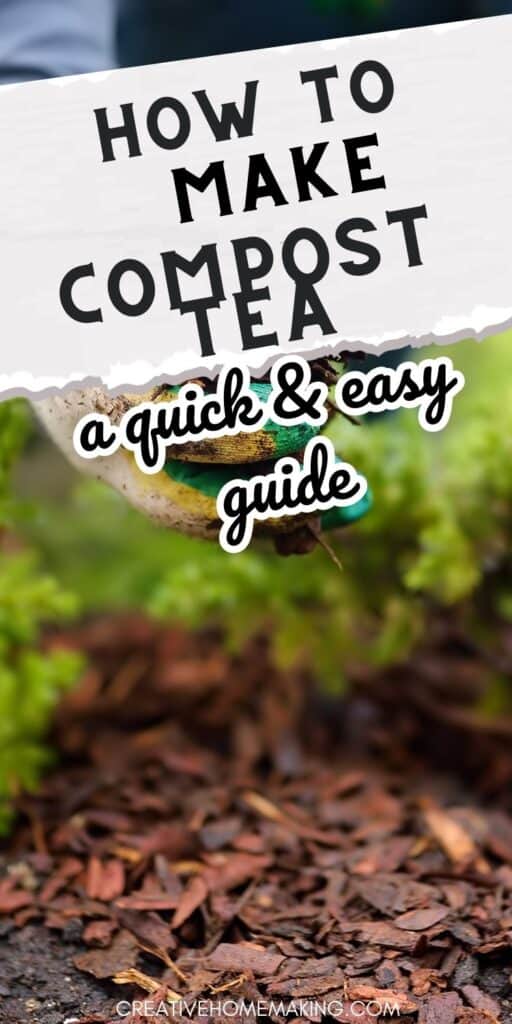
To ensure that your compost tea remains at its highest quality, here are a few tips that I recommend following:
- Store it properly: After brewing your compost tea, store it in a covered container to prevent contamination and maintain its microbial activity. Keep it in a cool, dark place to preserve its beneficial organisms.
- Check for spoilage: Regularly inspect the compost tea for any signs of spoilage or unpleasant odors. If you notice a foul smell or mold growth, it may indicate that the tea has gone bad. In such cases, it is best to discard it and start afresh.
- Use it within 24-48 hours: To ensure optimal results, use the compost tea within 24-48 hours of brewing. The microbial activity gradually decreases over time, reducing its effectiveness as a soil amendment.
By following these tips, you can maintain the quality of your compost tea and ensure that it continues to provide the maximum benefits to your plants and soil.
Common problems and how to troubleshoot them
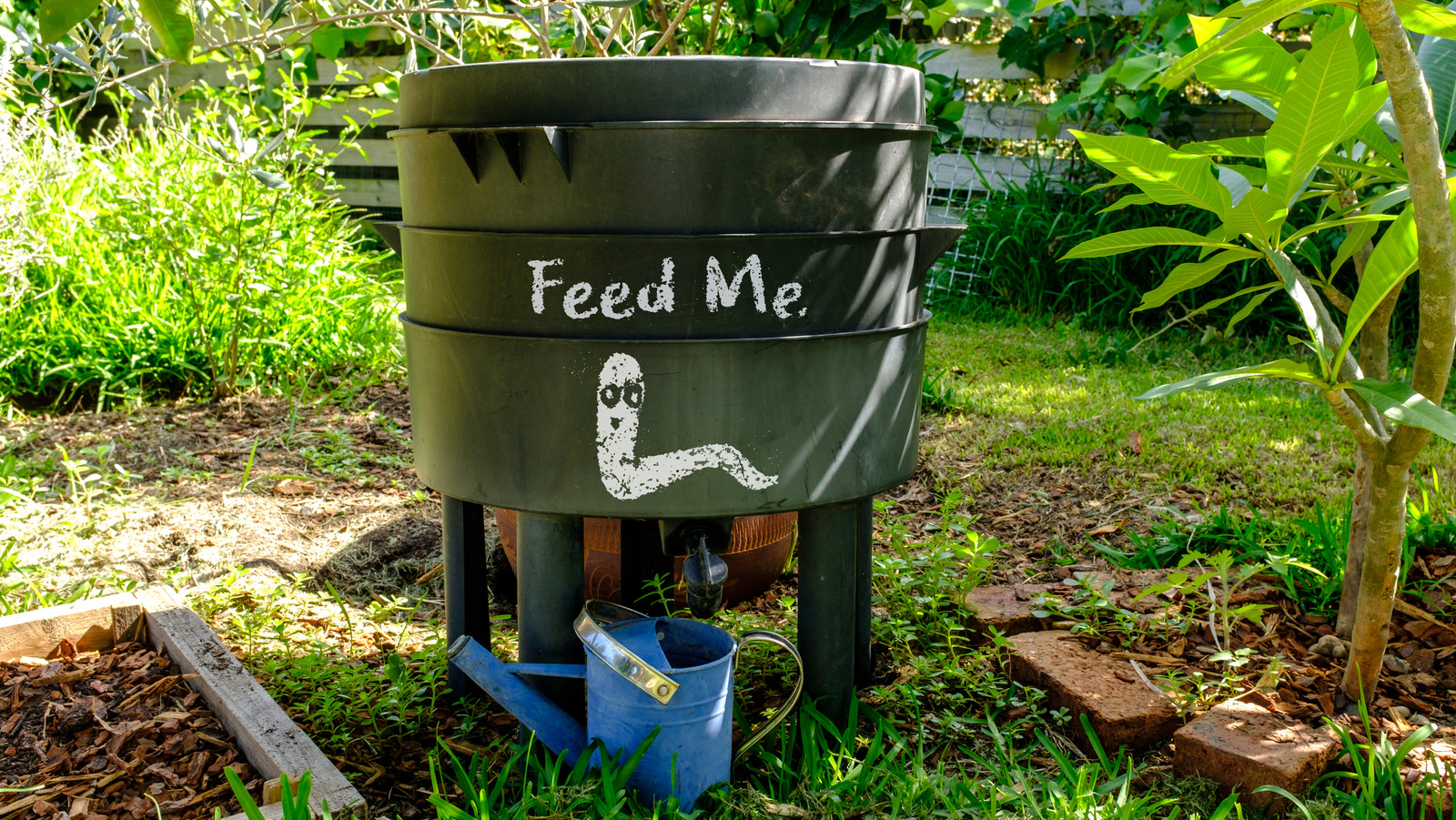
When brewing compost tea, there are a few common problems that you may encounter. Here are some troubleshooting tips to help you overcome these challenges:
- Foul odor: If your compost tea has a strong, unpleasant smell, it may indicate anaerobic conditions. To troubleshoot this, ensure proper aeration by using an aerator or stirring the tea regularly during the brewing process. Also, avoid overloading the tea with too much compost.
- Mold growth: If you notice mold growth on the surface of your compost tea, it could be a sign of excessive organic matter or inadequate aeration. To address this issue, reduce the amount of compost used or increase the aeration by stirring the tea more frequently.
- Low microbial activity: If your compost tea lacks the desired microbial activity, it may be due to insufficient brewing time or improper storage. Allow the tea to brew for an adequate duration, generally 24-48 hours, and store it in a cool, dark place to maintain the microbial population.
By addressing these common problems and following the proper brewing and storage techniques, you can ensure that your compost tea is of the highest quality and provides maximum benefits to your plants and soil.
Conclusion and Next Steps
/GettyImages-1253496831-11b73ed6b0084181afbf7eed0a453549.jpg)
In conclusion, compost tea is a valuable tool for improving plant health and promoting sustainable gardening practices. By using simple ingredients and equipment, you can easily make your own compost tea at home. Whether you choose the aerobic or anaerobic brewing method, the goal is to create a nutrient-rich liquid that is teeming with beneficial microorganisms.
Once you have brewed your compost tea, it’s important to apply it correctly to maximize its benefits. Different plants may require different application methods, such as foliar spraying or soil drenching. Regular use of compost tea can enhance soil fertility, support a healthy soil microbiome, and prevent pests and diseases.
To maintain the quality of your compost tea, make sure to properly store it in a cool, dark place and use it within a reasonable amount of time. Regular monitoring and troubleshooting can help address common issues like foul odors or mold growth.
In the next steps of your compost tea journey, I encourage you to experiment with different ingredients, brewing methods, and application techniques. Keep exploring sustainable gardening practices and continue to enrich your soil with nutrient-dense compost tea. Happy gardening!
Summary of the benefits of compost tea
:max_bytes(150000):strip_icc()/using-manure-tea-in-the-garden-2539481-5-574c3b1e46c445bc9b190e269decd0f0.jpg)
Compost tea offers numerous benefits for plant health and soil fertility. As a natural and organic fertilizer, compost tea provides essential nutrients to plants, promoting their growth and development. The microbial community found in compost tea helps improve soil structure, allowing for better water retention and nutrient absorption. This, in turn, enhances the overall health of the soil microbiome, creating a balanced and thriving ecosystem for plants.
Compost tea also helps prevent plant diseases and pests by introducing beneficial bacteria and fungi that outcompete harmful pathogens. Additionally, compost tea can be applied through foliar spraying or soil drenching, allowing for targeted and efficient nutrient delivery to plants. By using compost tea regularly, gardeners can reduce their reliance on synthetic fertilizers and pesticides, promoting a more sustainable and environmentally friendly approach to gardening.
Additional resources for further learning
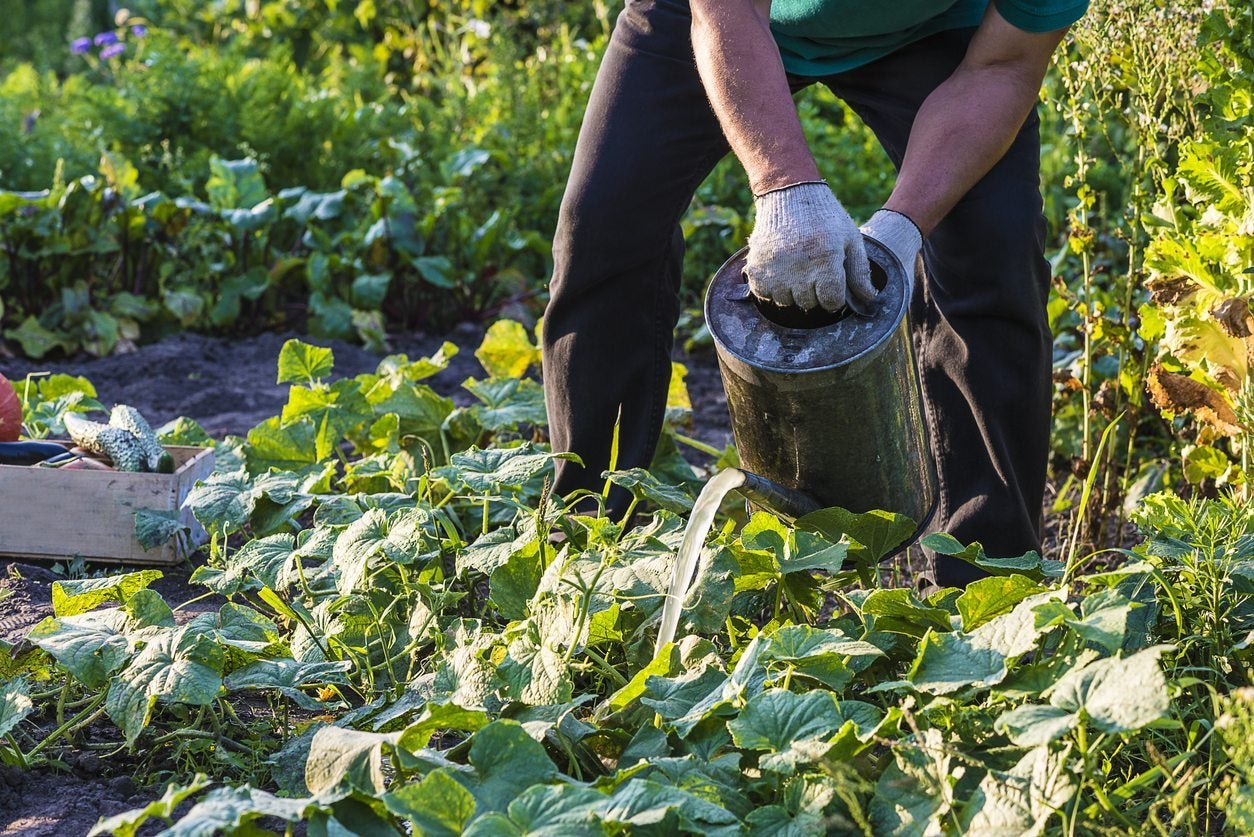
- Books: There are many books available that provide in-depth information on compost tea and its benefits. Some recommended titles include “Teaming with Microbes” by Jeff Lowenfels and Wayne Lewis, “The Compost Tea Brewing Manual” by Elaine Ingham, and “Compost Tea: Making and Using the Organic, Nutrient-Rich, Liquid Fertilizer” by Eric Fisher.
- Online Courses: If you’re looking for a more comprehensive understanding of compost tea and composting in general, there are online courses available. Websites like Udemy and Coursera offer courses on organic gardening, soil health, and composting techniques that cover the topic of compost tea.
- Workshops and Seminars: Many local gardening and farming organizations offer workshops and seminars on composting and sustainable gardening practices. These events often include hands-on demonstrations and expert advice on making and using compost tea.
- University Extension Programs: Agricultural extension programs offered by universities can be a valuable resource for learning about compost tea. These programs often provide research-based information and resources on sustainable gardening practices, including composting and compost tea.
- Online Forums and Discussion Boards: Joining online gardening communities and forums can connect you with experienced gardeners who can share their knowledge and experiences with compost tea. Websites like GardenWeb and Reddit’s gardening subreddit are great places to ask questions and learn from others.
Remember to always consult reputable sources and experts for accurate information on compost tea and its application before implementing any practices in your own garden.
Tags: compost, compost tea, compost tea brewer, compost tea diy, compost tea fertilizer, compost tea for vegetable garden, compost tea liquid fertilizer, compost tea recipe, diy compost tea, how to make compost, how to make compost at home, how to make compost tea, how to make compost tea at home, how to make compost tea fertilizer, how to make compost tea for plants, how to make easy compost tea, making compost tea, organic compost tea guide, organic fertilizer for plants







0 thoughts on “How to make compost tea for plants-2024”